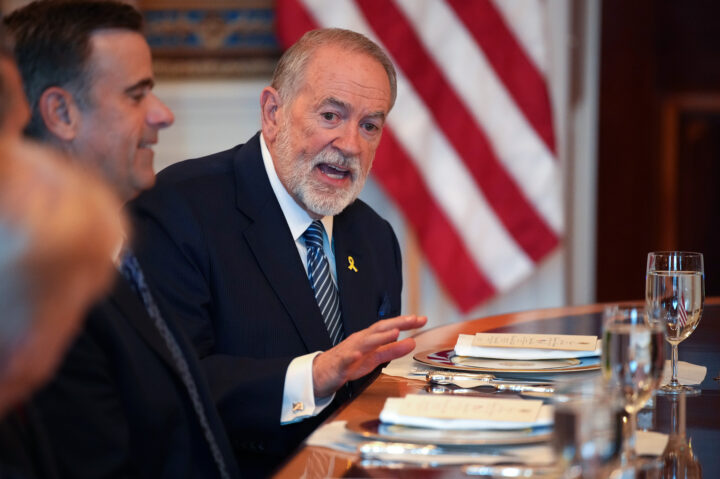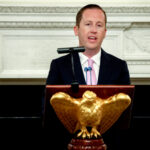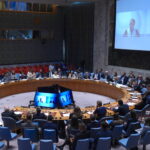A source in the PMO told JI that Israel has ‘absolutely no interest in undermining the freedom [of workers and volunteers for Christian organizations] coming to Israel’

Andrew Harnik/Getty Images
U.S. Ambassador to Israel Mike Huckabee delivers remarks as President Donald Trump hosts Israeli Prime Minister Benjamin Netanyahu for a dinner in the Blue Room of the White House on July 7, 2025, in Washington, DC.
Israeli Prime Minister Benjamin Netanyahu’s office resolved a dispute between U.S. Ambassador to Israel Mike Huckabee and Israeli Interior Minister Moshe Arbel over the denial of visas to workers and volunteers for several evangelical Christian organizations, two sources involved in the matter told Jewish Insider on Sunday.
“A solution has been reached to the satisfaction of all parties. The Evangelical Christian organizations active in Israel, which represent the vast majority of Zionists in the world today, will receive all of the visas they need through a streamlined and efficient application process,” Calev Myers, the attorney for the organizations told JI on Monday.
Hours before the issue was resolved, a source in the Prime Minister’s Office told JI, “this is something that we consider to be of urgent importance. We have every intention of solving this problem very quickly … It is being handled with the proper sensitivity between the Prime Minister’s Office and the embassy.”
The PMO source said that Israel has “absolutely no interest in undermining the freedom [of workers and volunteers for Christian organizations] coming to Israel … We value evangelicals. It’s very regrettable that there is a problem and we obviously have to fix it.”
Huckabee sent a letter to Arbel last Wednesday, expressing “great distress” and “profound disappointment” that after the two met to discuss the matter earlier this year, the Interior Ministry’s visa department continued to conduct investigations into American and other evangelical organizations seeking visas for their workers.
“It would be very unfortunate that our embassy would have to publicly announce throughout the United States that the State of Israel is no longer welcoming Christian organizations … and is instead engaging in harassment and negative treatment towards organizations with long-standing relationships and positive involvement toward Zionism and friendship to the Jewish people and the State of Israel,” Huckabee wrote.
If the situation continues, Huckabee added, he will instruct the U.S. Embassy’s consular section to treat Israeli citizens in kind.
“Surely this is not the relationship the State of Israel wishes to have with its best partner and friend on the planet,” he wrote.
A source close to Huckabee told JI that the ambassador did not intend for the letter to go public, which it did on Channel 12 news on Thursday evening.
Arbel responded on Thursday that he had committed “to reviewing such applications with the utmost efficiency,” instructed his staff to do so as well earlier this year, and that every specific case raised by Huckabee’s office was addressed “within an exceptionally short timeframe.” The interior minister argued that the specific organizations Huckabee mentioned in his letter were not the ones they had discussed in their meeting earlier this year.
Arbel also said he was surprised by the way Huckabee handled the matter — sending copies of the letter to Netanyahu, President Isaac Herzog, Foreign Minister Gideon Sa’ar and Knesset Speaker Amir Ohana — which, he said, “deviates from accepting working norms and does not reflect the direct and constructive relationship we have established.”
Rabbi Pesach Wolicki, executive director of Israel365action, an organization connecting Christians to pro-Israel advocacy, said that this has been a long-standing issue regarding clergy and other workers and long-term volunteers, and not Christian pilgrims coming to Israel for short visits.
Huckabee and attorney Calev Myers met with Arbel about six months ago to work out issues with a specific group of organizations, and Arbel said he would solve it, but the issue remained unresolved, Wolicki explained.
The exchange of letters also came up at a time of increased tensions between Israel and Christians, after what Israel said was an errant tank shell hit the only Catholic church in Gaza and killed three people, and after several incidents of harassment and attacks by extremist settlers against the Christian population of Taybeh in the West Bank.
Huckabee wrote on X on Saturday that “Taybeh is a quiet Palestinian Christian village south of Jerusalem w/ a lot of American citizens that has been vandalized-including fires set at ancient church. I visited there today. Desecrating a church,mosque or synagogue is a crime against humanity and God.”
“I work for all American citizens who live in Israel –Jewish, Muslim or Christian. When they are terrorized or victims of crime[s], I will demand those responsible be held accountable [with] real consequences,” the ambassador added.
Wolicki said that “the timing couldn’t have been worse.”
Israel has laws restricting missionary activity, and the visa issue has been exacerbated by the fact that the Shas party, whose Haredi constituency is especially sensitive to missionizing, has run the Interior Ministry for much of the last 25 years, he added.
“Any situation in which you have noncitizens in the country for the long term, it’s a bureaucratic process, and because of sensitivity about missionizing, this has always been an issue,” Wolicki said, noting that Israel365 has also had problems obtaining visas for Christian employees in the past.
The organizations Huckabee mentioned in his letter, the Baptist Convention of Israel, Christian Missionary Alliance and Assemblies of God are missionary groups, Wolicki said.
“There are official restrictions on missionary activity that, when Christians learn of them — and I say this with a lot of firsthand experience — it really moves them from support for Israel, even from the American level of valuing free speech … but also they feel like, how can you say you respect Christians and you want Christian support but we’re not even allowed to talk about Jesus when we’re there,” Wolicki said.
“Christians don’t think you’re offending anyone when you preach the gospel, and Jews view that as you have a knife and you’re trying to stab them,” he added.
Wolicki argued that the laws against missionary activity are problematic, though he acknowledged that abolishing them would likely be unpopular in Israel.
“Missionaries are active all over Israel anyway. There are Israelis who are active … Anyone concerned about missionary activity, which is a legitimate concern, should know this is not the solution. It causes more harm than good and makes Christians more hostile to the Jewish people,” he said.
Josh Reinstein, director of the Israel Allies Foundation, which promotes faith-based diplomacy, said that he has seen this issue come up repeatedly over the 21 years since the foundation was founded.
“It’s an ongoing issue because they always change the requirements for Bible-believing Christians and their organizations,” Reinstein said. “There are no protections for Evangelicals like the 14 mainline churches [the Israeli Religious Affairs Ministry] recognizes.”
“This needs a solution, but it is definitely not a crisis or a problem of Israel not wanting Christians as the enemies of Israel are making it out to be,” he added.
Reinstein questioned why what he called a minor issue was making bigger news than Christians under attack in Syria.
“Israel is the only place in the region where Christians grow and thrive, as opposed to in the 22 countries around us,” he said. “People understand the relations bewteen Jews and Christians is so important today…which is why they are trying to make it into a bigger deal than it is. Huckabee is one of the greatest allies and friends Israel has. I don’t think it was his intention to cause a rift.”






























































